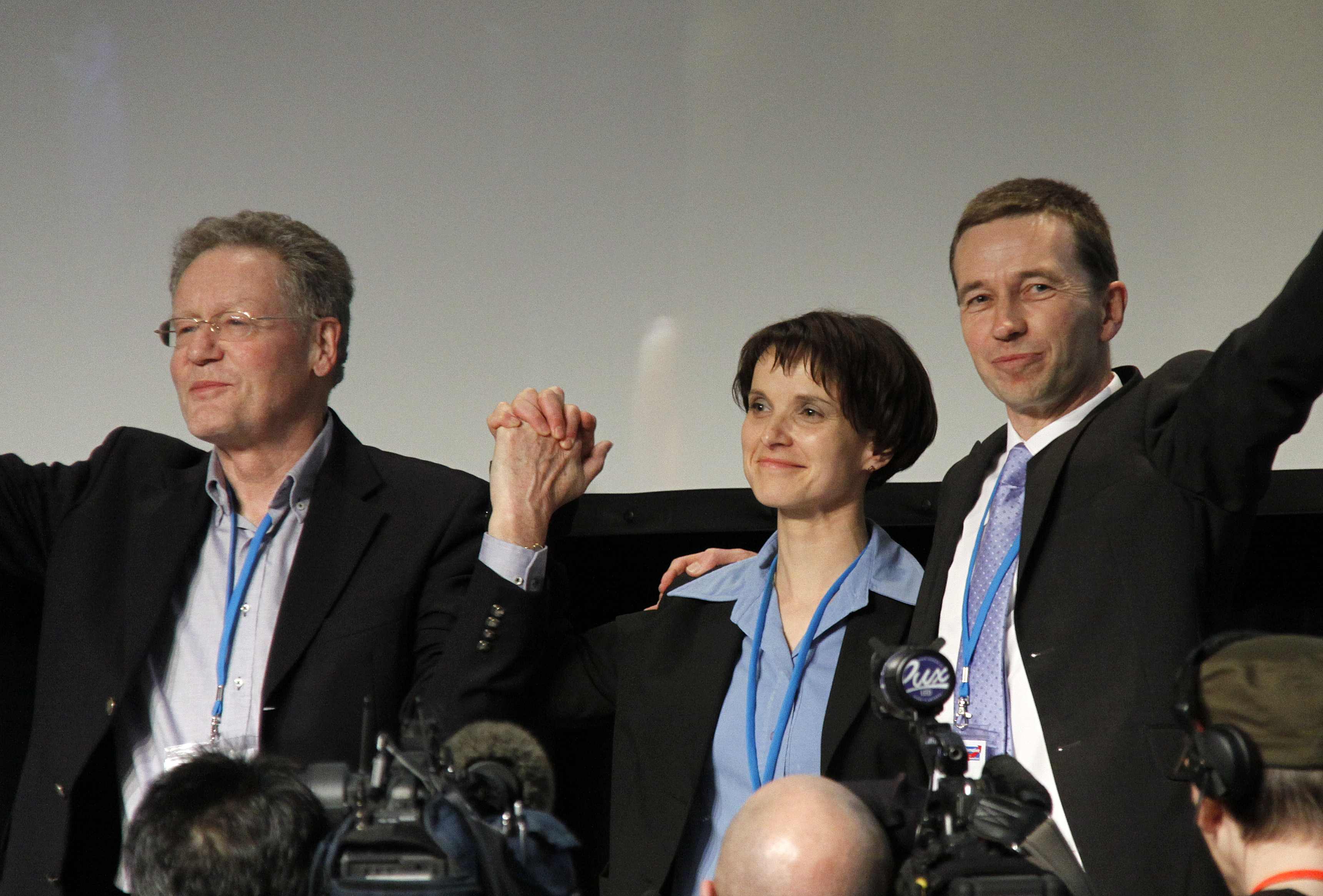
Alternative for Germany
 Alternative for Germany (, AfD, ) is a far-right, right-wing populist and national-conservative political party in Germany. The Federal Office for the Protection of the Constitution (BfV), Germany's domestic intelligence agency, had previously classified the party as a "confirmed right-wing extremist endeavour". This classification was temporarily suspended by the BfV a week after its announcement in May 2025. The report that led to the classification was later leaked to the public. The federal branch of the AfD has been under surveillance since a court ruling in 2022 after it was classified by the domestic intelligence as a "suspected extremist party" in 2021. This classification of a party represented in the federal parliament was a first in the history of Germany.
Alternative for Germany (, AfD, ) is a far-right, right-wing populist and national-conservative political party in Germany. The Federal Office for the Protection of the Constitution (BfV), Germany's domestic intelligence agency, had previously classified the party as a "confirmed right-wing extremist endeavour". This classification was temporarily suspended by the BfV a week after its announcement in May 2025. The report that led to the classification was later leaked to the public. The federal branch of the AfD has been under surveillance since a court ruling in 2022 after it was classified by the domestic intelligence as a "suspected extremist party" in 2021. This classification of a party represented in the federal parliament was a first in the history of Germany.Established in April 2013, AfD was founded by Gauland, Bernd Lucke, and former members of the Christian Democratic Union of Germany (CDU) to oppose the policies of the Eurozone as a right-wing and moderately Eurosceptic alternative to the centre-right but pro-European CDU. The party presented itself as an economically liberal, Eurosceptic, and conservative movement in its early years. AfD subsequently moved further to the right, and expanded its policies under successive leaderships to include opposition to immigration, Islam, and the European Union. Its name reflects its resistance to the mainstream policies of Angela Merkel and her slogan (, a German version of "there is no alternative"). Beginning in 2015, the party radicalized and shifted away from its former conservative-reactionary politics, and towards a growing ultranationalist wing from within known as Der Flügel (German for "''The Wing''") through figures such as Björn Höcke and Alexander Gauland, among others.
By 2020, völkisch nationalism, a type of ethnic nationalism that had been discredited in German politics for its influence on the Nazi Party, had become the party's dominant and core ideology. The party favours deeper German ties with China and Russia, is deeply Euroskeptic, and promotes anti-Americanism, accusing the United States of geopolitically dominating Europe for liberalism through NATO. Top AfD officials have been noted for close ties to China and Russia, and there have been arrests for foreign spies among their staff, leading to accusations of corruption and betrayal of national interest against AfD. Economic nationalism (including protectionism and government intervention), anti-feminism, opposition to LGBT rights movements, and opposition to Islam are also core aspects of the party. The AfD has had connections with far-right nationalist and proscribed movements, such as PEGIDA, the , and the Identitarian movement, and of employing historical revisionism, as well as xenophobic rhetoric. They have been observed by various state offices for the protection of the constitution since 2018. In January 2022, after a power struggle, Meuthen resigned his party chairmanship with immediate effect and left the AfD, stating that it had acquired totalitarian traits and in large parts was no longer based on the liberal democratic basic order. Former party chairman and co-founder Lucke left the party in 2015 with a similar remark.
The party narrowly missed the 5% electoral threshold to sit in the Bundestag during the 2013 federal election. It won seven seats in the 2014 European Parliament election in Germany as a member of the European Conservatives and Reformists (ECR). After securing representation in 14 of the 16 German state parliaments by October 2017, AfD won 94 seats in the 2017 federal election and became the third-largest party in the country, as well as the largest opposition party; its lead candidates were the co-vice chairman Alexander Gauland and Alice Weidel, the latter having served as the party group leader in the 19th Bundestag. In the 2021 federal election, the AfD struggled, declining to the fifth-largest party in the 20th Bundestag. Following the 2025 election, it obtained its best vote total ever, and became the largest opposition party and second-largest party overall in the 21st Bundestag.file:bad Provided by Wikipedia
1
Published: Berlin : Alternative für Deutschland, 2016.
Other Authors:
“...Alternative für Deutschland...”
Book
2
3
Published: Wiesbaden : Springer VS, 2016
Other Authors:
“...Fachtagung Politische Programmatik und Entwicklung der Partei "Alternative für Deutschland" (2015...”Inhaltsverzeichnis
Book

